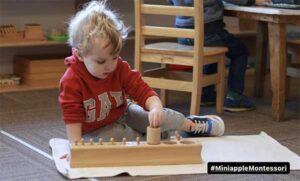
Montessori programs for toddlers have gained recognition for their unique approach to early childhood learning. Enrolling your child in a Montessori school will allow them to begin developing independence and self-regulation at a young age. Continue reading to learn why Montessori toddler programs are ideal for promoting independence.
Learning in a Prepared Environment
Central to a Montessori education for toddlers is the concept of a prepared environment. In a Montessori classroom, everything is carefully designed to meet a child’s needs and foster independence. Furniture, materials, and activities are scaled to the child’s size, which allows them to access and use them independently. Your child might be more enthusiastic about learning in a prepared environment.
Developing Practical Life Skills
One of the cornerstones of a Montessori education for toddlers is the emphasis on practical life skills. Children are encouraged to participate in everyday tasks like washing dishes, sweeping, and pouring water. These activities will not only promote independence but also teach essential life skills. Through hands-on experiences, children develop fine motor skills, concentration, and the ability to complete tasks on their own.
Improving Through Self-Assessment
Montessori materials are designed to be self-correcting. A Montessori learning tool might consist of various cube sizes that children can learn to arrange from the largest to the smallest. If a mistake is made, the child can visually identify it and make the necessary adjustments. This process teaches self-regulation and the importance of accuracy in a positive way.
Enjoying the Freedom of Choice
Montessori programs are designed to give children freedom within boundaries. This freedom of choice empowers children to become leaders, which helps to foster independence and self-confidence from an early age. When a toddler is presented with the freedom of choice, he or she becomes more motivated, which leads to a deeper understanding of the subject matter. This concept encourages self-directed learning so toddlers can choose activities that capture their interest and engage their curiosity.
Taking Time to Learn Effectively
Montessori programs acknowledge that every child learns at their own pace, and teachers work with each child individually after careful observation of their developmental level and interests. In a Montessori classroom, children are not rushed or held back by a predetermined curriculum. They are allowed to progress through activities as they comprehend the concepts, which promotes self-regulation and self-awareness of their abilities and challenges.
Working on Projects with Peers
While independence is a focal point in Montessori education, collaboration is also encouraged. For instance, children are free to work independently, but they also have opportunities for group activities and for observing or partnering with a peer. These interactions help them develop important social skills, including empathy, conflict resolution, and effective communication. Learning to work both independently and collaboratively is essential for self-regulation and independence in various life situations.
Going Outdoors to Explore Nature
Time spent in natural environments helps children develop a strong connection with the world around them. Whether it is gardening, observing wildlife, or simply playing outdoors, these experiences encourage children to explore, discover, and appreciate the wonders of the natural world. Spending time outdoors can also give children a sense of peace, which can have a positive impact on their mood.
As more parents and educators recognize the benefits of Montessori education, it continues to play a vital role in shaping the future of our youngest learners. Toddlers learn to regulate their impulses, emotions, and behaviors independently while they are being educated. Contact us today if you are interested in enrolling your child in a Montessori program.

